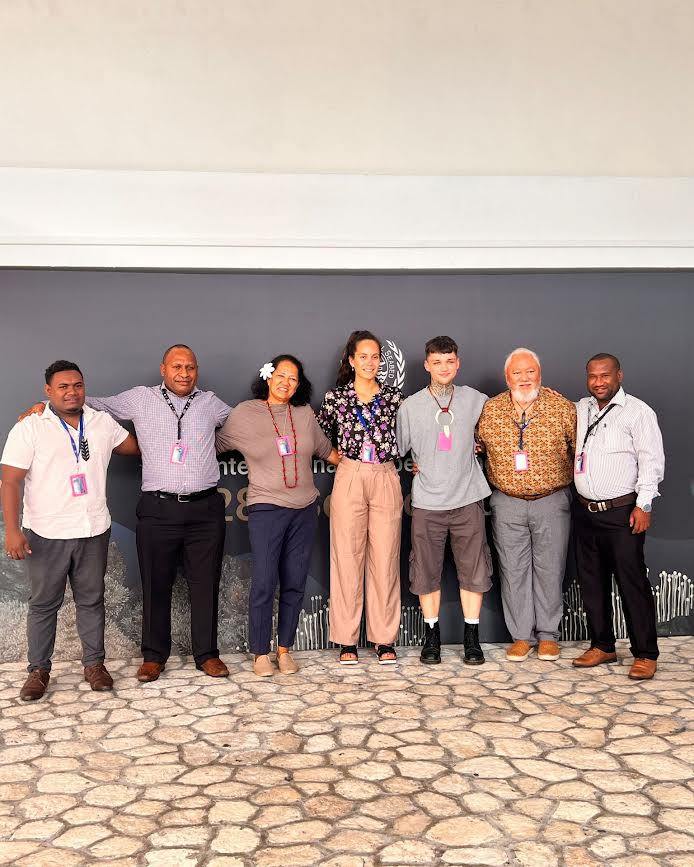Te Ipukarea Society: Extraction or protection? The dual mandate dilemma of the International Seabed Authority
Saturday 5 August 2023 | Written by Te Ipukarea Society | Published in Environment, National

Pacific civil society representation at the most recent International Seabed Authority Meeting. From left, Roderick Rolland (Solomon Islands), Anthony Wakep (Papua New Guinea), Hinano Murphy (Tahiti)m, Alanna Smith (Cook Islands), Quack Pirihi (New Zealand), Sol Kaho'ohalahala (Hawaii) and Jonothan Mesulam (PNG). TIS/23080301
The International Seabed Authority (ISA) has the dual mandate of regulating mining of the seabed and also protecting that same seabed in areas beyond national jurisdiction (also known as international waters, high seas, or simply the area).
Meetings of the ISA now occur three times a year. The increase in number of meetings is the result of the industry and some pro mining developing states putting pressure on the council to move more quickly to prepare a set of regulations to govern mining in the high seas. Since 2015, the Cook Islands have been represented at the ISA meetings by the Seabed Minerals Authority. This was the year our country went into a joint venture with GSR, a Belgium mining company. This joint venture company is currently undertaking exploration for deepsea nodule mining within Cook Islands waters. Two other companies are also exploring our seabed with a view to start mining.
The Council Meetings which took place in the first two weeks concluded with no deep-sea mining code agreed or adopted. States were also not able to agree on how to close the two-year rule loophole. It effectively remains open so any sponsoring State can still apply to mine, even in the absence of regulations.
The Assembly meeting which occurred in the third week is the supreme organ of the ISA body. It represents the full 169 countries who have signed the United Nations Convention on the Law of the Sea. However only 64 countries attended this year’s Assembly meeting.
Despite the dual mandate of the ISA, which includes protection of the seabed, the ISA seems to prioritise the mining side of their mandate. Historically there has been no discussion of seabed protection placed on the agenda over the years. During this Assembly week, a discussion on the protection of the marine environment, including a pause on deep-sea mining was added as a supplementary agenda item. The opportunity to debate this matter however was initially blocked by Nauru, Mexico and then ultimately by China.
Far more States supported allowing the discussion on protection to be had for the first time. But a consensus is needed by the entire Assembly for anything to be approved.
In the end, the crucial agenda item on the protection of our marine environment was not approved for debate during the Assembly. However it was agreed that these discussions could be proposed for inclusion on the provisional agenda in next year’s 29th Assembly session.
The assembly included the participation of our Cook Islands Prime Minister on a delegation of five including representatives from Seabed Minerals Authority (SBMA) and Cook Islands Investment Corporation (CIIC). The Cook Islands PM, Mark Brown made an intervention on the Cook Islands development.
Rima Browne from SBMA was presented with the Fourth Edition of the Secretary General’s Award for Excellence in Deep Sea Research for geomorphological mapping conducted in Cook Islands waters. Rima is the first in the Pacific to receive this award. We hope many young Cook Islanders consider studying deep sea research, particularly in the field of biological diversity. It is just so important for us to understand what is living in our deep ocean before we decide whether to start full scale mining of this seabed home to potentially thousands of unknown species.
As well as having international state representation, the Assembly Meetings were attended by numerous representatives of Pacific civil society. This included the Solomon Islands, Papua New Guinea, Tahiti, Te Ipukarea Society Cook Islands, Aotearoa and Hawaii.
As deep-sea mining could most likely start in the centre of the Pacific Ocean, Indigenous Pacific representatives participated in debates to speak out for their rights, culture and connection to the ocean, as well as the right to free, prior and informed consent be respected.
During the meetings the Assembly approved eight requests for observer status, which included Te Ipukarea Society (TIS). Observer status now provides TIS the opportunity to make statements during the Assembly and Council meetings. TIS is the first national NGO in the Pacific to be accepted as an observer at the ISA.
We know the deepsea is one of the most under-explored environments in the world. The abyssal plains at over 4000m deep where polymetallic nodule mining could occur have unique conditions that are slow evolving and therefore very sensitive to disturbance. Because of these conditions, seabed mining impacts during pilot studies have been found to cause irreversible environmental damage.
To date, there are still many gaps in deep sea environmental data. Te Ipukarea Society supports a moratorium to ensure robust independent research is carried out to inform management decisions. We are very concerned that most of the current research is conducted by mining companies.
The risks to the health of our ocean, which we rely on so much for our survival, are far too great for us to consider mining at this stage.



















































